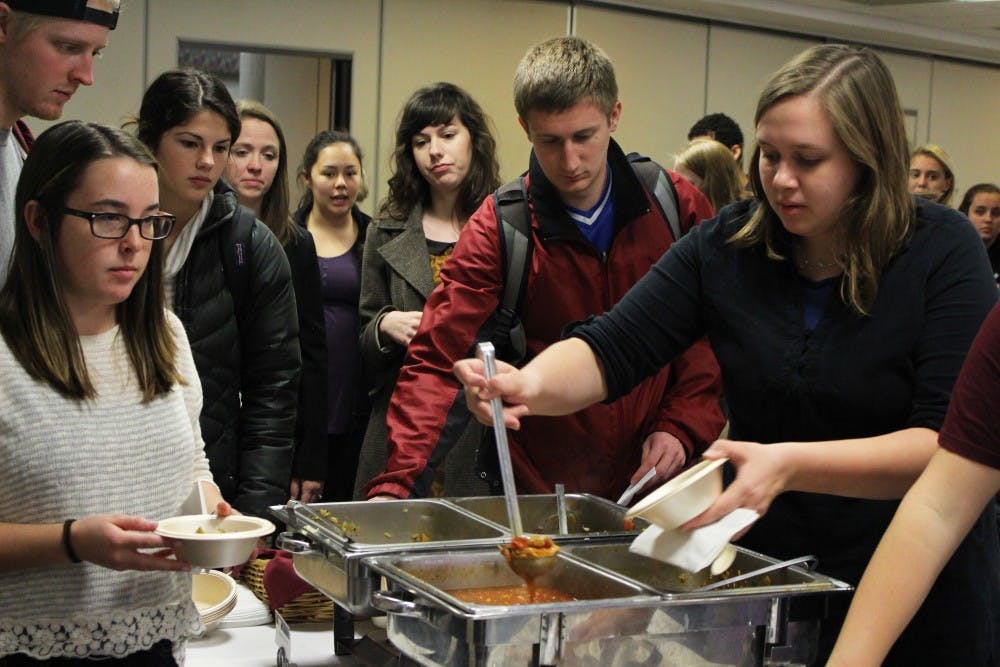Germaine Tremmel reveals 'horrors' of Dakota Access Pipeline at Soup & Substance event

Audience members get soup during the Soup and Substance event on Nov. 8, in the Bovee University Center.
Germaine Tremmel did not hesitate to say what will happen to the Native American people if the Dakota Access Pipeline wins the battle in Standing Rock, North Dakota.
"If we lose this battle, we lose our identity," Tremmel said.
Tremmel is a native of Standing Rock, which is currently in a battle for clean water against the Dakota Access Pipeline. Tremmel was at Central Michigan University on Tuesday for a Soup & Substance event as part of Native American Heritage Month.
A packed audience filled the terrace rooms inside the Bovee University Center, forcing an influx of extra chairs and tables. Those in attendance had the choice of either vegetable brown or chicken pinto bean chili soups, along with ice water, tea or coffee.
As students enjoyed the meal, Tremmel highlighted the somber state of those affected by Energy Transfer Partners' Dakota Access Pipeline. She said the pipeline has destroyed grave sites and sacred areas.
About an hour before the event, wifi and video were shut off from the region. Helicopters and snipers have patrolled the area, and smoke bombs have been in effect.
"You lay on the ground and it's like a war zone out there," Tremmel said.
There are about 14,000 people in Standing Rock currently, and only nine kitchens. There are four emergency medical tents and one emergency room — all made up of volunteers — in the five major camps in Standing Rock.
People have come and gone from the location every day, but Tremmel said she and the people are not protesters, but protectors.
"You are not a visitor, but a relative," she said.
Tremmel said 47 out of 141 people arrested during an incident on Oct. 27 went to court and were charged with disorderly conduct before the charges were changed to a federal felony for starting a riot. There is no recourse to sue the state for a felony.

Some Native American youth traveled to Washington D.C. in July to attempt to speak with President Barack Obama or First Lady Michelle Obama in an event titled "ReZpect Our Water." They were refused.
Tremmel said she is happy with the young people who have helped raise awareness for the issue.
"We are not radicals, we are not terrorists (and) we are not inciters of a riot," Tremmel said.
She said they are people of prayer.
Tremmel said some people are locked in cages when they are arrested and are treated like animals. She added the elderly have been beaten, two of her horses have been killed and her granddaughter was shot in the leg.
North Dakota Gov. Jack Dalrymple said businesses that sell supplies to the protesters will be closed down. There have been 427 arrests of people ages eight and over and about 50 clergy members have been arrested and refuse to eat in jail.
“At times, I kind of was just so surprised at just hearing about what’s going on," Wyandotte sophomore Ashleigh Laho. "It was kind of crazy to hear about what’s happening in this country and what’s happening every day there.".
While smoke bombs have begun to be put in place, she said those involved with the Dakota Access Pipeline do not want the word to get out.
"Are you awake? Are you awake?" Tremmel said as a motivational speech to the crowd, advising them to keep getting the word out.
Tremmel said 380 tribes have come together for the first time in history, and not as enemies. She said this is a battle to retain culture, identity, language and territory.
"It's important you know who you are, (so you) reclaim what is yours," she said.
She mentioned the Dakota Access Pipeline does not have permission from the Court of Engineers to put the pipe in and could be on hold for 30 days. Still, the grave sites of prominent people in the area have already been destroyed, and Tremmel said the pipeline has violated the 1851 Treaty which established the Great Sioux Reservation.
"These sites are very sacred to us because they're a part of who we are," Tremmel said.
Laho said she wanted to look more into the 1851 Treaty after the event, but was upset at what she heard throughout.
"I’m really kind of upset and shocked that this is going on," she said. "Obviously I don’t support the Dakota Access Pipeline but I think it needs to stop and I think their sacred grounds need to be respected.”
Tremmel said she was disappointed in Obama, who came to Standing Rock and lied to the children about wanting to see them. Obama also said he would wait to see how the pipeline plays out.
While the United Nations and Amnesty International have been involved with Standing Rock, Tremmel said she is working on the first case of ecocide with UN peacekeepers.
Southfield senior Djemila Fields said she learned about the Dakota Access Pipeline this summer by watching a documentary on Viceland titled "Dear President Obama." She said she wants to help out those affected by the pipeline and said society needs to do a better job of highlighting Native American issues.
"You basically haven’t heard anything about it in the (presidential) debates," Fields said. "You’re not really taught about Native American issues in classes about prejudices. It mainly focuses on the African American and Latino issues, which are important but you don’t really hear much about Native American issues.”
Tremmel said food, supplies, blankets and gloves are among the items the protesters most need in their fight for clean water. She said the purest form of water are tears.
"Water is life," Tremmel said to conclude her speech.



